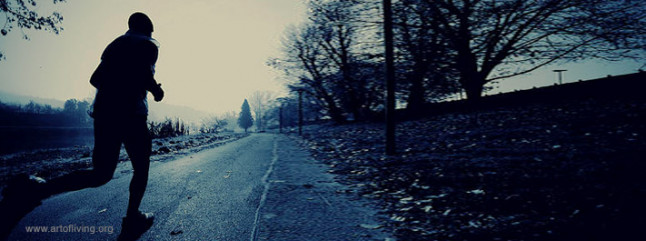"No pain, no gain!"
Seven –time Mr. Olympia Arnold Schwarzenegger said this phrase sometime during his career which went on to become the workout attitude defining statement of our times. It is crisp and apt, just the way a phrase should be. But is pain really that essential? What if one could work out a plan to minimize the pain and maximize the benefits of their workout? Does it sound too good to be true?
Surprisingly, it isn't. When most of us think of achieving a well-toned body, the first thing that comes to our mind is running. It is one of the most commonly practiced and inexpensive ways to get rid of those extra pounds. It also increases the stamina – a perfect win-win situation.
But tread with caution. Running is synonymous with injuries in the hip, thigh, knee, leg, ankle and foot regions. While most instructors recommend a bit of stretching before the sprint, just stretching is simply not good enough. As a runner one must learn to practice a couple of yoga postures through programs like the Sri Sri Yoga course to understand what postures can really help you push your limits. A couple of minutes spent reposing in these ancient yogic postures can help you go that extra mile when you hit the treadmill.
This custom-tailored yoga for runners will prepare your body for sprint with 10 simple postures :
1. Butterfly pose (Badhakonasana)
Badhakonasana is a good stretch for inner thighs, groin, hamstrings and knees. It also improves flexibility in the hip and groin region.
2. Sitting Half Spinal Twist (Ardha Matsyendrasana)
Ardha Matsyendrasana improves the elasticity of the spine and makes it suppler.
3. Standing Forward Bend (Hastapadasana)
Hastapadasana helps stretch all the muscles of the back of the body, tone the abdominal organs and also helps make the spine supple.
4. Standing Forward Bend with Feet Apart (Prasarita Padahastasana)
Prasarita Padahastasana stretches the hamstrings, legs and feet. It also lengthens the spine and strengthens the abdomen.
5. Triangle Pose (Trikonasana)
Trikonasana strengthens the legs, knees, ankles, arms, and chest. It also stretches and opens the hips, groins, hamstrings,calves, shoulders, chest, and spine. It is also known to increase the mental and physical equilibrium.
Vrikshasana makes the legs strong, improves balance and opens the hips. It also rejuvenates the body and helps bring balance and equilibrium to the mind of the runner.
7. Warrior Pose (Veerabhadrasana or Virabhadrasana)
Veerabhadrasana helps tone the arms, lower back and legs. It also increases the stamina and brings balance in the body.
8. Sideways Bending Using Both Arms (Konasana)
Konasana helps stretch the sides of the body and the spine. It also tones the arms, legs and abdominal organs.
9. Upward Plank Pose (Poorvottanasana)
Poorvottanasana stretches the hips and legs; strengthens the wrists, arms, shoulders, back and spine.
Utkatasana exercises the spine, hips and chest muscles. It also tones the thigh, ankle, leg and knee muscles.
Running is a very healthy workout that keeps you physically fit and boosts your stamina. If you love running, you may also join local running groups in your area and eventually even participate in marathons. Clubbing your passion for running with yoga will help enhance your capability to enjoy running.
Yoga practice helps develop the body and mind bringing a lot of health benefits yet is not a substitute for medicine. It is important to learn and practice yoga postures under the supervision of a trained Sri Sri Yoga teacher. In case of any medical condition, practice yoga postures after consulting a doctor and a Sri Sri Yoga teacher. Find a Sri Sri Yoga course at an Art of Living Center near you. Do you need information on courses or share feedback? Write to us at info@srisriyoga.in

